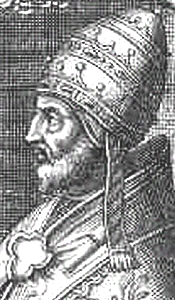 Adrian
V (also known as Hadrian V), né Ottobuono de'
Fieschi (c. 1205 – August 18, 1276), pope in
1276, was a Genoese nobleman.
Adrian
V (also known as Hadrian V), né Ottobuono de'
Fieschi (c. 1205 – August 18, 1276), pope in
1276, was a Genoese nobleman.His first clerical position came in 1243, when he was created a papal chaplain. In December 1251, he was created Cardinal Deacon of San Adriano by his uncle Innocent IV. He was, in addition, the archdeacon of Parma and Reims. The dates are unknown for Parma, but it is known he became Archdeacon of Reims in 1250.
He was sent to England in 1265 by Clement IV to mediate between King Henry III and his barons, and to preach the Crusades; he remained there for several years as the papal legate, serving from October 1265 to July 1268. His diplomatic position was such that his name is still on the oldest extant piece of English statute law, the Statute of Marlborough of 1267, where the formal title mentions as a witness "the Lord Ottobon, at that time legate in England.". (Also on this legation was a young diplomat, the future Boniface VIII.) In April 1268 he issued a set of canons, which formed the basis of church law in England until the reformation of the sixteenth century.
He was elected pope to succeed Innocent V on July 12, 1276, but died at Viterbo on August 18, without ever having been ordained to the priesthood; he is buried there in the church of S. Francesco. Technically, since Adrian was never ordained bishop, he never truly became the Bishop of Rome, but traditionally he is counted in the papal succession.
He achieved little during his time as Pope; he annulled Gregory X's bull on the holding of papal conclaves, but died before enacting new regulations.

